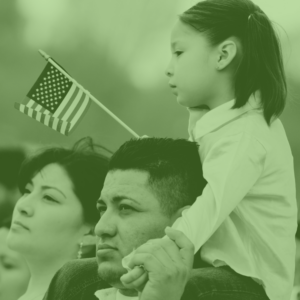Earlier this year, ahead of the Governor’s proposed budget, we shared our 2025 Springfield Agenda, which laid out all the education, immigration, and housing policies and investments that we would advocate for that were critical to the well-being of Latino families.
However, because of fiscal constraints, this legislative session proved particularly challenging and was made more complicated by threats from the federal government to cut critical funding and aggressively target immigrant communities. While we celebrated important wins like the passage of Safe Schools for All and Dual Language Expansion, we also faced significant setbacks and disappointments. We are especially concerned about the complete elimination of funding for the Health Benefits for Immigrant Adults (HBIA) program, which will devastate the more than 32,000 people who rely on it for their health care needs, as well as cuts to the HOME Illinois initiative which will set back our goal of achieving “functional zero” homelessness in our state.
Illinois has a proud tradition of being the most protective in the nation for immigrants, which has made it possible for many generations of immigrant and Latino families, and the state as a whole, to thrive. And it is this very tradition that has made our state a target of the federal government. We firmly believe that capitulating to the tireless efforts to cut funding and criminalize immigrant communities will not make them stop. Because of this, we will continue to fight to protect these programs.
There were real setbacks this session, but this is not the end. This year’s outcomes are our roadmap forward, for next year and any opportunities that arise during the summer or veto session. We will never stop advocating for our community, because it’s more necessary than ever. The challenges we face only strengthen our resolve to continue fighting for the policies and investments that Latino and immigrant families need to thrive in Illinois.
- HB3247, Safe Schools for All: Legislation affirming every child’s right to an education under state law and prohibits barriers to that right on the basis of immigration status. Ready for Governor’s signature.
- HB3026, Dual Language Expansion: Legislation to create guidance for school districts interested in establishing new dual language programs or expanding existing programs. Dual language programs teach curriculums in another language and English in the same classroom.
- SB406, Establishes an Early Childhood Integrated Data System (ECIDS) to help improve early childhood services by giving families and providers better access to data, making the system simpler, better and more equitable across ECE services.
- HB3439, Forum partners IAFC and Start Early worked together to pass legislation to make existing DCFS guidance on provisional hiring into law and extend the requirement for staff background checks from every three years to every five.
- $90 million increase for Smart Start Workforce Grants to maintain existing program support as federal relief funds expire. This grant has been critical in increasing educator wages as a way to maintain workforce stability across the state.
- $85 million increase for the Child Care Assistance Program (CCAP) at the Illinois Department of Human Services (IDHS) to support growing caseloads and raise reimbursement rates for home-based providers.
- $7.5 million in new operations funding for the Illinois Department of Early Childhood to continue building infrastructure as early learning programs transition in July 2026 to the new department.
- A provider rate increase for the Early Intervention (EI) program to help stabilize the workforce.
- A $307 million increase for Evidence-Based Funding formula, which prioritizes funding for schools that need it most. We applaud the Governor’s team for increasing equitable funding in a time of tremendous budget constraint. Continued advocacy for equitable funding will be needed in the years to come with proposed federal cuts.
- $30 million for Teacher Vacancy Grants (TVGG) to support targeted teacher pipeline efforts. While this is a $15M reduction in the third and final year of the pilot, we laud the Governor for prioritizing teacher recruitment and retention initiatives.
- HB3522, Direct Admission: Provides that, beginning with the 2027-2028 academic year, the Board of Higher Education, in collaboration with the Illinois Community College Board, the Illinois Student Assistance Commission, and the State Board of Education, shall establish and administer a direct admission program. Ready for the Governor’s signature.
- SB2039, IBHE Data Dashboard Report: In collaboration with the Illinois Community College Board and the Illinois Student Assistance Commission, shall prepare and release a State Data Dashboard Report and Data Dashboard Report for each public institution of higher education and each private college and university in the State. Ready for the Governor’s signature.
- SB1958, Transfer Reform: In provisions concerning community college and State university transfer articulation agreements, provides that community colleges and State universities are encouraged to enter into agreements whereby community college students may indicate their transfer destination of choice on their application to the community college. Ready for the Governor’s signature.
- HB3385, Higher Education Mental Health Action: Provides that each public college or university shall provide at least three licensed mental health professionals or, if the benchmark ratio falls under three, at least the number of licensed mental health professionals. Ready for the Governor’s signature.
- $10 million increase to the Monetary Assistance Program. We thank the General Assembly for its continued commitment to college affordability. However, given recent federal actions, the allocated amount falls short of what is needed to make meaningful improvements in college affordability for Latino students. We will continue to advocate for increased funding to support our students’ persistence and graduation.
- We commend the state for increasing investments in our community colleges and public universities. However, the respective increases of 1.5% for community colleges and 1% for public four-year institutions fall short of what these institutions need to serve Latino students effectively and support all students through college completion, as well as continue expanding programming and hiring the necessary faculty and staff to meet student needs. Given the anticipated federal cuts to public institutions of higher education, we will continue to advocate for increased funding for our community colleges and public universities to ensure a healthy higher education ecosystem in Illinois.
- $8 million for the Minority Teachers of Illinois Scholarship, which is awarded to minority students pursuing post-secondary degrees in education. In light of a lawsuit challenging this scholarship, we will continue to monitor SB1331 and changes that may evolve.
- HB2436, the bill to expand Cook County Public Defender jurisdiction, allowing the office to represent Cook County residents in deportation proceedings regardless of where they are detained. This is a win for immigrants and a win for due process for all, especially at a time when immigrants are being detained in other states and their constitutional rights are under attack.
- $2 million increase for Immigrant Integration Services. We are pleased to see that the Illinois Coalition for Immigrant and Refugee Rights (ICIRR) secured an additional $2 million in funding to support the New Americans Initiative and Immigrant Family Resource Program for a total of $40 million. ICIRR’s partner organizations have consistently and successfully facilitated the long-term integration of immigrant families through these programs across the state.
- $10 million increase for Illinois Access to Justice (A2J). This falls $15 million short of what was requested. However, we are grateful for the additional funding so that The Resurrection Project and A2J partners can continue providing legal education, expand its geographical reach, and reach more people in need.
- Slight increase ($600,000) to the Illinois Legal Support Program (ILSP). Tens of thousands of migrants who have come to Illinois over the last three years are now at risk of deportation due to recent Supreme Court rulings allowing for the termination of TPS and humanitarian parole. This funding is critical as migrants seek alternative forms of relief and deportation defense.
- Continued investments for Illinois Welcoming Centers (IWCs). This will help maintain the State’s capacity to provide culturally and linguistically responsive services to support the integration of new and long-term immigrants. The Forum will continue to advocate for additional investments to further expand the model across parts of the State with limited access to these services.
- $42 million for the Emergency and Transitional Housing (ETH) Program. This funding will help expand and strengthen services for individuals and families facing homelessness, providing crucial short-term shelter and transitional housing for those in need.
- $4.7 million, a $1 million increase, to expand the Shelter Diversion Program that will help people avoid shelters through alternative housing solutions.
- $16.2 million for the Homelessness Prevention Program to provide more resources for at-risk households and keep families and individuals housed before they face homelessness.
- $6 million for Supportive Housing Programs. This increase can help strengthen various supportive housing initiatives to ensure individuals and families experiencing homelessness have the long-term support they need.
- $9 million in new funding for the One System Initiative to unify the existing new arrival shelter system with current legacy shelters with the aim to serve all unhoused Chicagoans.




